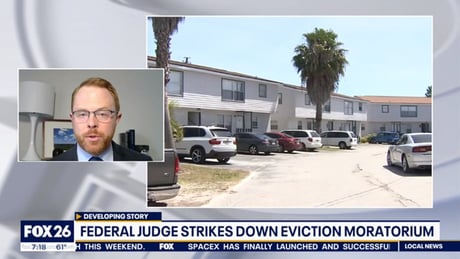As companies of all types and sizes continue to deal with the potential legal implications of the COVID-19 pandemic for their businesses, Jackson Walker provides insights and resources on the COVID-19 Legal Resources & Insights site.
Yesterday, a federal judge in the District of Columbia vacated a nationwide ban on many residential evictions by the Centers for Disease Control and Prevention (CDC). Hours later, in response to a request from the Department of Justice, the judge temporarily stayed that order, effectively extending the CDC’s eviction moratorium through at least late next week.
In March 2020, Congress enacted the Coronavirus Aid, Relief and Economic Security Act (CARES Act), which included a 120-day eviction moratorium for rental properties that participated in federal assistance programs or were subject to federally-backed loans. After the CARES Act moratorium expired, the CDC issued an order of its own that barred evictions from most residential properties nationwide for tenants likely to become homeless or be forced into shared housing if evicted (CDC Order).
Related: Federal Eviction Moratorium Broadened and Extended Through the End of 2020 »
The propriety of the moratorium has been challenged in several courts across the country. In the last several months, at least six courts have considered various statutory and constitutional challenges to the moratorium. On May 5, 2021, U.S. District Judge Dabney Friederich, a United States District Court Judge for the District of Columbia, vacated the moratorium in a memorandum opinion.
The lawsuit was filed on November 20, 2020, by a coalition of property owners and realtors from several states, including the Alabama and Georgia Associations of Realtors. The plaintiffs challenged the moratorium on a number of statutory and constitutional grounds and asked the court to vacate the moratorium as unlawful because it exceeds the authority provided to the CDC in the Public Health Service Act, 42 U.S.C. Section 264(a). In the memorandum opinion, the Court posed “[t]he question….[as] a narrow one: Does the Public Health Service Act grant the CDC the legal authority to impose a nationwide eviction moratorium?” The Court opined that the Public Health Service Act authorizes the CDC to combat the spread of disease through a range of measures, but “these measures plainly do not encompass the nationwide eviction moratorium set forth in the CDC Order.” As a result, the Court ultimately answered “no” to its question and determined the CDC exceeded the authority provided in Section 361 of the Public Health Service Act by enacting the moratorium.
The CDC asked the Court to limit its decision to vacate the CDC Order to only the plaintiffs with standing in the case before the court. The Court noted the CDC’s request, but vacated the CDC Order in its entirety without limiting the reach of its decision to the plaintiffs. Although the Court’s ruling has a national impact, it only affects the federal moratorium in the CDC Order. It does not change the terms or duration of eviction freezes enacted by state and local governments.
 |
RELATED—IN THE NEWS
Federal Judge Strikes Down Eviction MoratoriumJackson Walker partner Brad Nitschke spoke with FOX 26 Houston about a federal judge’s decision to vacate the CDC’s national eviction moratorium and what protections are available to renters as the Biden administration appeals the decision. |
For additional information on how the evolving orders might affect you or your business, please contact a Jackson Walker attorney and follow our COVID-19 updates at JW.com/Coronavirus.
Related Resources:
- JW Coronavirus Insights & Resources microsite »
- COVID-19 & Your Business: Frequent Questions »
- JW Fast Takes Podcasts & Webinars »
- Sign Up for JW eAlerts »
Please note: This article and any resources presented on the JW Coronavirus Insights & Resources site are for informational purposes only, do not constitute legal or medical advice, and are not a substitute for legal advice from qualified counsel. The laws of other states and nations may be entirely different from what is described. Your use of these materials does not create an attorney-client relationship between you and Jackson Walker. The facts and results of each case will vary, and no particular result can be guaranteed.
